
How Local Education Initiatives Are Unlocking Possibilities for Arizona Students
From early childhood through college, Arizona communities are harnessing the transformative potential of education to unlock opportunities for young people and their families to thrive. Local education initiatives in municipalities throughout the state enable more students to meet key learning benchmarks and overcome barriers to success. The Helios Education Foundation has identified third-grade reading, postsecondary enrollment, and postsecondary attainment as key drivers for student success locally and across Arizona. This brief highlights standout local and statewide education initiatives championed in Arizona Mayors Education Roundtable member communities that address these three student success drivers.
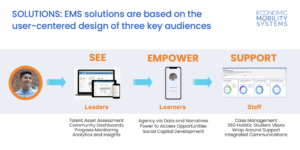
Personalized Educational and Career Pathways in Arizona
Since January 2021, the Arizona Mayors Education Roundtable has benefited from guidance and wisdom provided by Economic Mobility Systems (EMS) — a trusted partner committed to putting the student first, collaboration, community building, and equitable outcomes. EMS develops partnerships that produce a strong return on investment ensuring postsecondary readiness, enrollment, persistence, and completion as well as achieving workforce alignment, entry, and living wage attainment. The Roundtable reached out to Dr. Eric J. Ban, Executive Director, to produce this issue brief on integrated data platforms that empower students as they embark on their career journeys.
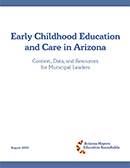
Early Childhood Education and Care in Arizona
The Arizona Mayors Education Roundtable, in partnership with the Arizona Pre-K Alignment for Early Childhood Success Initiative team, developed this resource to shed light on early childhood education and care. It provides an overview of key issues, a collection of data points on early childhood gaps and the estimated economic impact of those gaps, and a set of Roundtable member snapshots. Taken as a whole, this resource offers a point-in-time perspective on early childhood education and care in Arizona using the most current available data, some of which predates the COVID-19 pandemic.
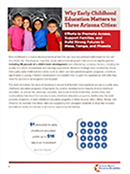
Why Early Childhood Education Matters to Three Arizona Cities: Efforts to Promote Access, Support Families, and Build Strong Futures in Mesa, Tempe, and Phoenix
This brief summarizes a March 2020 Roundtable convening and articulates the value of quality early childhood education programs. Snapshots of programs in three Arizona cities — Mesa, Tempe, and Phoenix — illustrate how communities are supporting their youngest residents in ways that increase educational equity and access to economic opportunity for families.
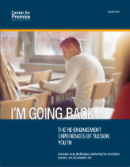
I’m Going Back: The Re-Engagement Experiences of Tucson Youth
In this 2019 report, Center for Promise researchers spoke with young people about the multiple barriers and factors in their lives that contributed to their decisions to leave or to return and persist through high school.
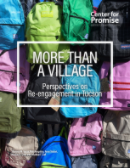
More Than a Village: Perspectives on Re-Engagement in Tucson
After speaking with young people about their experiences with re-engagement, the Center for Promise researchers set out to understand what it takes to support enhanced graduation rates. More Than a Village: Perspectives on Re-Engagement in Tucson is the second report in a two-part research series that focuses on high school re-engagement in Tucson, Arizona.
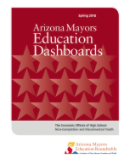
2018 Arizona Mayors Education Dashboards
This 2018 report presents profiles, for each of the cities and towns whose mayors were initial Roundtable members, that show the estimated economic loss associated with high school non-completion and youth disconnection (young people who are neither in school nor working) in each locality. The report is accompanied by an explanatory guide.
IN THE NEWS
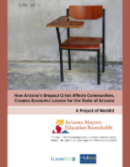
How Arizona’s Dropout Crisis Affects Communities, Creates Economic Losses for the State of Arizona
Twenty percent of young people in Arizona never graduate from high school and a similar proportion are disconnected from either work or education. These individuals may experience higher joblessness and economic uncertainty, and may be more dependent on government support. Failing to adequately prepare them for success in college, career, and adulthood can create social and financial losses for the federal, state, and local governments. This report details the social and fiscal losses related to high school non-completion and youth disconnection.

